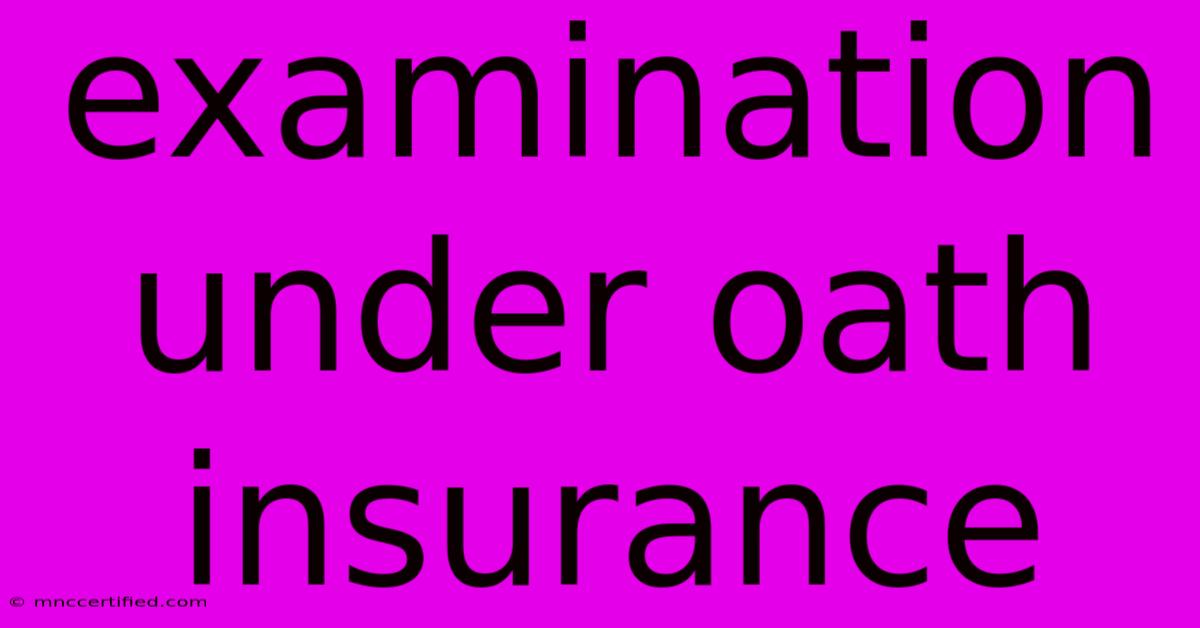Examination Under Oath Insurance

Table of Contents
Examination Under Oath (EUO) in Insurance Claims: A Comprehensive Guide
An Examination Under Oath (EUO), also known as a sworn statement, is a formal proceeding in insurance claims where the claimant is questioned under oath by an insurance adjuster or attorney. This process is a critical part of the claims investigation and can significantly impact the outcome of your claim. Understanding what to expect and how to prepare is crucial. This guide provides a comprehensive overview of EUOs and offers strategies for navigating this potentially challenging situation.
What is an Examination Under Oath (EUO)?
An EUO is a crucial step in the insurance claims process, particularly for larger or complex claims. The insurance company has the right to require an EUO as part of its investigation into the validity and extent of your claim. Think of it as a more formal and legally binding version of a simple interview. During the EUO, you'll be asked questions under oath, meaning you are legally obligated to tell the truth. False statements made during an EUO can have serious legal consequences, including the denial of your claim or even legal action against you.
Why do Insurance Companies Request EUOs?
Insurance companies use EUOs to gather detailed information and verify the accuracy of the information provided in your claim. They may request an EUO if they suspect:
- Fraud: If there are inconsistencies in your statements or evidence suggests fraudulent activity.
- Exaggerated Claims: If the damages claimed seem excessive compared to the evidence presented.
- Lack of Information: If the initial claim lacks sufficient detail or supporting documentation.
- Complex Claims: In cases involving significant losses or multiple parties.
Preparing for Your Examination Under Oath
Proper preparation is key to a successful EUO. Failing to prepare adequately can significantly weaken your claim. Here are some crucial steps:
1. Review Your Claim Thoroughly:
Before the EUO, meticulously review all documents related to your claim. This includes your initial claim form, supporting documentation (photos, videos, receipts), communication with the insurance adjuster, and any previous statements you've made. Identify any potential inconsistencies or areas where your memory might be unclear.
2. Gather Supporting Documentation:
Compile all relevant documents that support your claim. Organize them chronologically and logically. Having this documentation readily available can help you answer questions accurately and confidently.
3. Practice Answering Questions:
Anticipate questions the insurance adjuster might ask. Practice answering them clearly, concisely, and truthfully. Consider having someone role-play the EUO with you to help you feel more comfortable.
4. Bring a Support Person:
While you can't have a lawyer present during the EUO itself (unless specific circumstances apply), it's beneficial to have a trusted friend or family member accompany you for moral support. They can take notes and provide emotional support.
5. Understand Your Rights:
You have the right to remain silent on questions that might incriminate you. However, exercising this right may negatively affect your claim. It’s best to consult with an attorney to understand your rights and the potential implications of your answers.
During the Examination Under Oath
During the EUO, remember to:
- Be Honest and Accurate: Provide truthful answers to all questions.
- Speak Clearly and Concisely: Avoid rambling or providing unnecessary information.
- Take Your Time: Don't feel pressured to answer quickly. If you need clarification, ask for it.
- Stay Calm and Composed: Maintain your composure, even if the questioning becomes intense.
- Bring Documentation: Reference your organized documentation to ensure accuracy.
- Request Breaks if Needed: Don't hesitate to request breaks if you feel overwhelmed.
Consequences of Failing an EUO
Failure to appear for a scheduled EUO or providing false statements during the examination can have severe consequences, including:
- Claim Denial: The insurance company can deny your claim entirely.
- Legal Action: You may face legal action for fraud or perjury.
- Damage to Reputation: Your credibility could be damaged, making it difficult to obtain insurance in the future.
When to Seek Legal Counsel
If you're facing an EUO, especially for a complex or high-value claim, it's highly recommended to seek legal counsel. An attorney can advise you on your rights, help you prepare for the EUO, and represent your interests throughout the process. They can ensure your rights are protected and help you navigate the legal complexities involved.
Keywords: Examination Under Oath, EUO, Insurance Claim, Insurance Investigation, Sworn Statement, Insurance Fraud, Claim Denial, Legal Counsel, Insurance Attorney, Prepare for EUO, Insurance Adjuster, High Value Claim
This article provides comprehensive information about EUOs. Remember that legal advice should be sought from a qualified professional. This information is for educational purposes only and should not be considered legal advice.

Thank you for visiting our website wich cover about Examination Under Oath Insurance. We hope the information provided has been useful to you. Feel free to contact us if you have any questions or need further assistance. See you next time and dont miss to bookmark.
Featured Posts
-
Wilson Honors George Strait Cma 2024
Nov 21, 2024
-
Richard Geres Live Tv Gesture
Nov 21, 2024
-
Oscar Health Insurance Tennessee
Nov 21, 2024
-
Thyroid Test Cost With Insurance
Nov 21, 2024
-
Bomb Cyclone And Atmospheric River Severe Weather
Nov 21, 2024